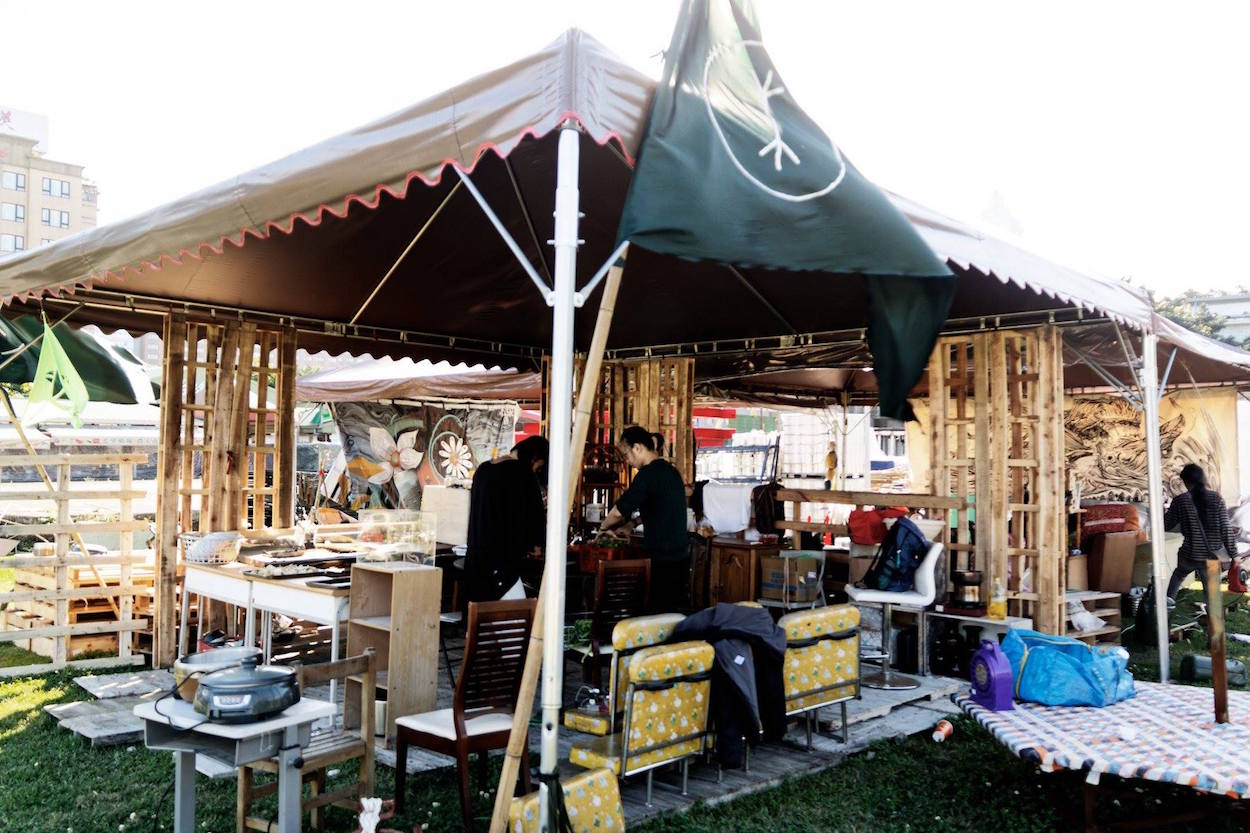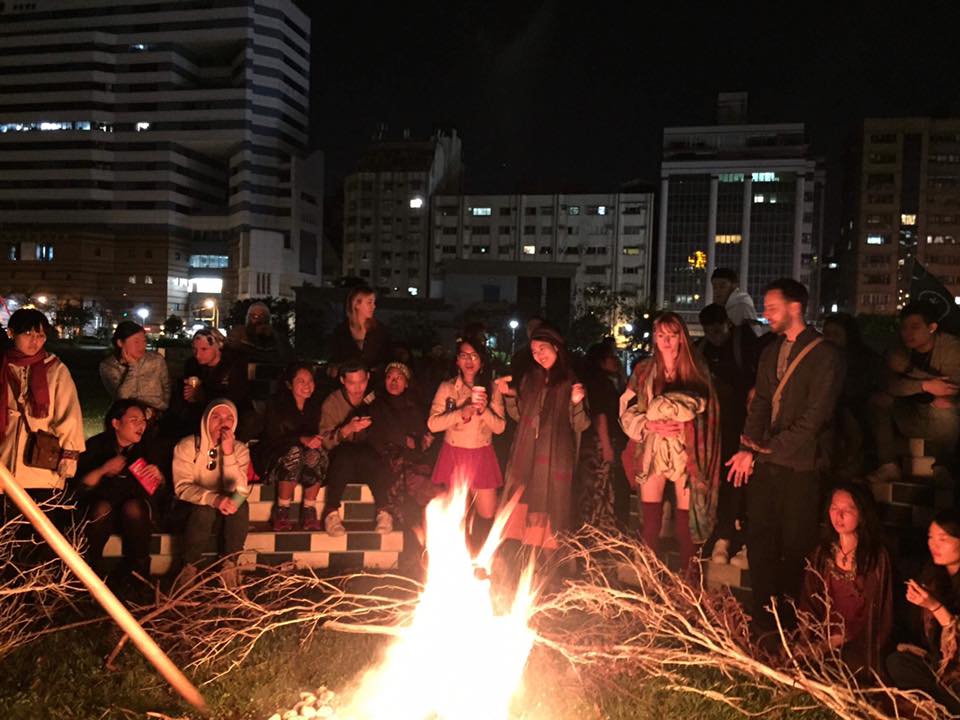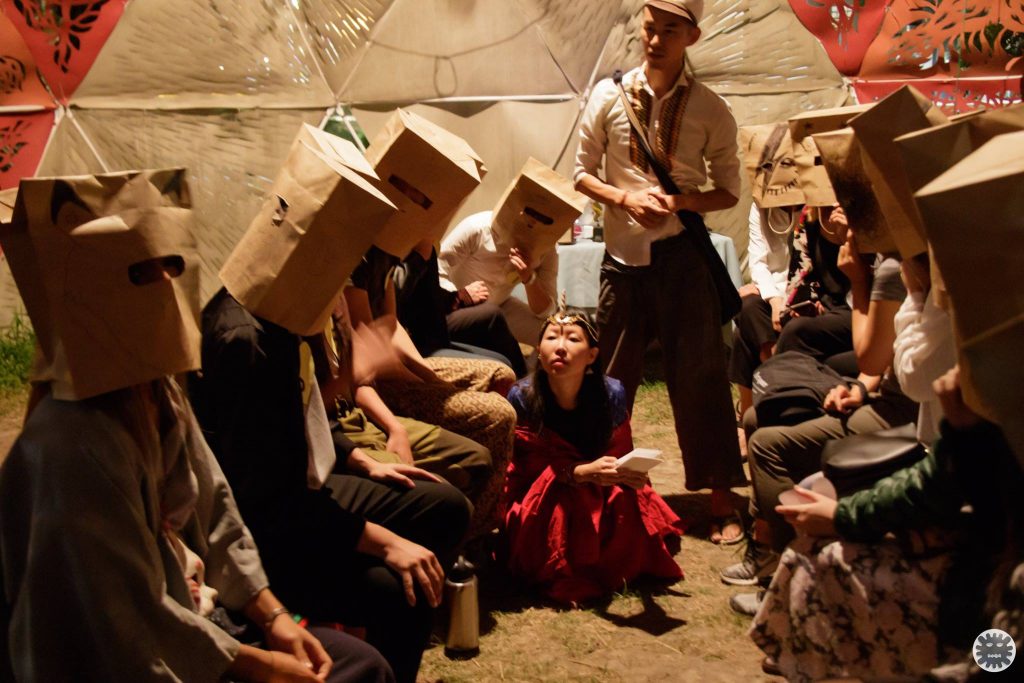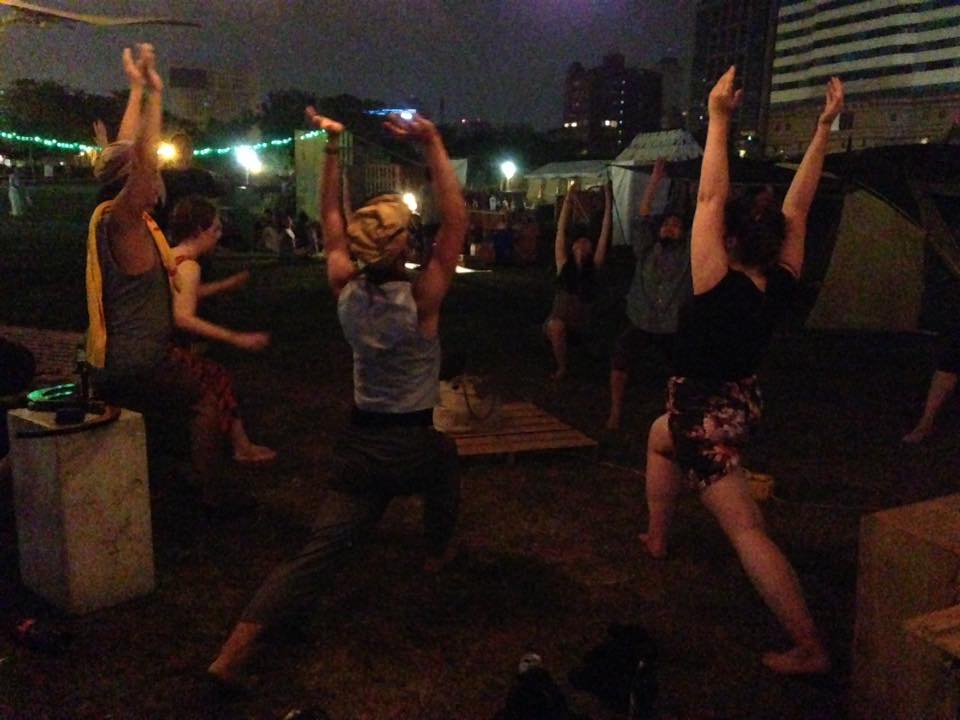by Brian Hioe
語言:
English /// 中文
Photo Credit: 120草原自治區 grassroots/Facebook
The Latest in a Series of Murder and Dismemberment Incidents
THE CONSERVATISM of Taiwanese social morality can be observed in reactions to a recent murder case that occurred in the 120 Grassroots Self-Autonomous Zone, involving the dismemberment of a 30-year-old woman surnamed Gao by a 37-year-old archery teacher surnamed Chen. What is visible through such reactions are attempts to displace blame onto a small group of young people while avoiding addressing deep-rooted problems of toxic masculinity in Taiwanese society. Much reactions have been centered on the Internet, particularly through PTT, including doxxing of Grassroots organizers by way of the “human flesh search engine”.
Gao disappeared two weeks ago after an event at the 120 Grassroots Self-Autonomous Zone, a temporary arts space that has occupied a grass field in the Shandao Temple area after a group of artists and young people applied for use of the space from the city government, forming something like a small artists’ commune. Chen was the last person to see her. Gao’s body was discovered on Monday after police, who remained suspicious of Chen, secured a confession from him.
 Photo credit: 120草原自治區 grassroots/Facebook
Photo credit: 120草原自治區 grassroots/Facebook
Gao had been strangled by Chen at the 120 Grassroots Self-Autonomous Zone after refusing Chen’s alleged sexual assaults. Chen, who offered archery classes at the 120 Grassroots Self-Autonomous Zone, stored the body for three days before moving the body to Yangming Mountain, where the remains were later found. In particular, Chen dismembered the body into seven pieces, making this the latest in a long series of dismemberment cases that have taken place in the past two months in Taiwan.
Namely, many reactions from Taiwanese society, as amplified by the media, have honed in on the 120 Grassroots Self-Autonomous Zone, calling for the space to be dismantled and closed, and with the view that the space itself is to blame. Other perceptions are that the 120 Grassroots Self-Autonomous Zone has shirked responsibility for the incident. The 120 Grassroots Self-Autonomous Zone was originally scheduled to be closed at the end of the month, seeing as the use period for the space was only to run until the end of June, but the space has now been prematurely shuttered, likely meaning that any events that 120 Grassroots’ residents were planning on holding to celebrate the space will have to be cancelled.
A Failure to Address Toxic Masculinity as the Cause for these and Other Incidents
YET SUCH Internet-based reactions from Taiwanese society largely fail to engage with any of the substantive reasons for Gao’s death, or the occurrence of other recent murder or dismemberment cases in Taiwanese—seemingly all of which, one notes, were incidents of men killing women. This points to the fact that the ultimate roots of the wave of dismemberments which have swept Taiwan in the past two months is in toxic masculinity, as in social attitudes which naturalize or even justify male violence against women as a legitimate reaction.
 Photo credit: 120草原自治區 grassroots/Facebook
Photo credit: 120草原自治區 grassroots/Facebook
Most oftentimes, this is with regards to naturalization of male violence against women as a reaction to romantic rejection in its various forms. This can be observed in the murder and dismemberment of 27-year-old NTU graduate Huang I-min (黃亦敏) by her boyfriend, 28-year-old boxer Gary Chu (朱峻穎) in late May, after Chu was unhappy with Huang for speaking with other men and accused her of cheating on him. Huang’s body was later found cut into eight pieces by Chu, having been buried in a flower garden. Posts by Chu show that he lashed out at Huang with claims that she had deceived him about being a virgin after the two met on Tinder and that she continued to be in contact with other men, including foreigners, after the two began dating. This can also be observed in the May 25th stabbing death of 27-year-old Chiu Chiao-Chi (邱喬琪), a popular livestreamer on 17 Media, by the 26-year-old Liao Yan-ting (廖晏霆), who claims to have been Chiu’s ex-boyfriend. Liao seems to have justified his murder by claiming that Liao was working in a hostess club and had cheated on him by going out with other men.
While media and reactions from society have sometimes honed in on the degenerate morality of young people in its coverage of such murder cases, one observes that these social attitudes are far from limited to just young people. Observes this in how on May 26th, a 68-year-old woman was murdered and dismembered by her 67-year-old husband, Chen Teng-ko (陳登科), after she asked for a divorce.
 Photo credit: 120草原自治區 grassroots/Facebook
Photo credit: 120草原自治區 grassroots/Facebook
Unfortunately, violence against women is pervasive in Taiwanese society. Rates of domestic violence are alarmingly high in Taiwan, with one case taking place every five minutes. 117,550 cases of domestic violence were reported in 2016—alarmingly high for a country with a population of 23 million. One can imagine that many times more cases go unreported in Taiwan, because little is often done to address even known cases of sexual violence, domestic abuse is carried out by men across a wide swath of social demographics and class backgrounds, and a culture of silence leads to women being afraid to speak out. In 2012, the US Human Rights Report listed domestic abuse as the greatest challenge facing Taiwanese society. The Ministry of the Interior in that year also suggested that the total number of sexual assaults which take place in Taiwanese society is ten times that which is reported. Male privilege in Taiwan is far from broken, which is what allows for and naturalizes male violence against women.
One suspects that this issue is furthered by Taiwanese media. Taiwanese media can prove highly sensationalist in nature, not only with regards to murder, violent crime, or sexual assault against young female victims, but also when such acts are committed by women, as observed in cases as the Mama Mouth murder incident. When Taiwanese media hypes lurid cases involving violent murders or dismemberment, this is not usually with the intent of addressing the deep-seated problems of violence against women in Taiwanese society, but simply profiting off of public attention to violent acts against women.
 Photo credit: 120草原自治區 grassroots/Facebook
Photo credit: 120草原自治區 grassroots/Facebook
Furthermore, the attitudes that Taiwanese media takes towards women can also be seen as contributing to the problem. Women, for example, are discussed purely in terms of their physical attractiveness in even serious news media, leading to the widespread objectification of women in Taiwanese society. The view of women purely in terms of their physical attributes contributes to the view that violent behavior against women is an acceptable response to romantic rejection. The fact that many gossip-heavy news media outlets view it as acceptable to literally stalk women in order to secure scoops about their private lives also naturalizes stalking behavior and violent intrusions of female privacy, perhaps providing a template for a great deal of social behavior. Media and society act in such a manner as to mutually reinforce toxic masculinity, male privilege, and patriarchy in Taiwanese society, as constituting something of a feedback loop.
Instead An Attempt To Scapegoat Young People And Creatives
IT MAY NOT be surprising that, rather than engaging with issues of male violence against women in Taiwanese society, Internet-based members of the public have instead seen fit to target the residents of 120 Grassroots Self-Autonomous Zone. Unfortunately, given the conservatism of Taiwanese social morality in many cases, generally will be that those who look different or act different will be seen as more prone to antisocial behavior, as with artists or young people living alternative lifestyles. As such, they make a convenient scapegoat for conservative social morality which scarcely wishes to look itself in the mirror and deal with its own deep-seated misogyny.
 Photo credit: 120草原自治區 grassroots/Facebook
Photo credit: 120草原自治區 grassroots/Facebook
This does not mean that misogynistic behavior from men does not also exist among counter-culture and the artistic community in Taipei, as one observes in comments by in misogynistic comments by writer and artist Chen Ke-hua (陳克華) attributing the cause of recent murder incidents to women “wanting to be like prostitutes”. This can be seen, too, artist Wang Mo-lin (王墨林) defending such comments by Chen and lashing out against criticism of misogyny as a form of out-of-control political correctness from the post-Sunflower generation—comments made, ironically enough, in a talk at 120 Grassroots, reportedly the same night that Gao went missing. Far from being a form of political correctness, in denigrating women, such comments make light of violence against women, contributing to the continual occurrence of such incidents.
But, as has been pointed out, one notes that in as highly commercial a city as Taipei, spaces for young people to enjoy themselves as the 120 Grassroots Autonomous Zone, which emphasizes that it is a free space that is non-commercial in nature, are rare. It is probably this, too, which leads to conservative social reactions against such a space. After all, if the murder incident had happened not at Grassroots, but simply a few hundred meters away at the Huashan Cultural and Creative Park—a highly commercial and consumerist space which otherwise veils itself in the pretension of being a free, creative space for artists and other creatives—members of society would scarcely be calling for the shuttering of the Huashan Cultural and Creative Park. Reactions against the 120 Grassroots Autonomous Zone have been because of the unusual nature of the space and when numerous other incidents have taken place in what is perceived as parts of “normal society,” there is no such backlash against where such incidents took place.
 Photo credit: 120草原自治區 grassroots/Facebook
Photo credit: 120草原自治區 grassroots/Facebook
Nevertheless, one expects reactions from Taiwanese society going forward to ultimately be detrimental to future artistic efforts as the 120 Grassroots Autonomous Zone. It will probably become more difficult for artistic communities to apply for resources or space from the government—seeing as politicians shrink away from scandals above all else.
Some in the artistic community also are unhappy with Grassroots’ response to the case so far, taking the view that Grassroots’ response has been inadequate in disclaiming responsibility from themselves—without taking into account how this will affect the wider artistic community going forward—and the view that Grassroots took inadequate safety measures against sexual assault, or even the gender dynamics of the 120 Grassroots space itself—which may have contributed to this event taking place. Some also seek to turn the discussion towards a broader discussion of incidents of rape in party culture. If the tragedy of the incident prompts deeper reflection among the artistic community about what more could have been done, this is a positive development.
However, such discussions generally remain confined to the artistic community, sometimes have the character of being self-castigating out of a sense of guilt, and, either way, are conducted with a higher degree of nuance, whereas instead reactions from society writ large have simply just pinned the blame on young people and called for the 120 Grassroots Self-Autonomous Zone and all similar spaces to be stamped out. At the same time, some suggestions have been outlandish, such as calling for locks to be removed from all public places or suggesting that the parents of the victim sue Grassroots. Others have blamed Grassroots members for failing to sufficiently search the premises and having not discovered the body—although it seems decidedly odd to blame Grassroots if the police, who professionally deal with investigation of missing persons, did not find the body, much less that Grassroots members, who decidedly are not professional sleuths were unable to. It also proves strange for individuals to see Grassroots as guilty for not having exactly imagined that an inhabitant of their camp was a murderer—perhaps a case of being too innocent more than too guilty.
 Photo credit: 120草原自治區 grassroots/Facebook
Photo credit: 120草原自治區 grassroots/Facebook
One hazards members of the artistic community against self-castigation out of a sense of guilt in a manner that is ultimately counterproductive, leaving deep emotional scars among individuals who may have done nothing wrong as though they had committed the murder themselves. This at times both an attempt to displace a sense of personal guilt onto a smaller group of individuals who felt them involved—not so different from society’s attempts to displace blame from itself—as well as simultaneously a form of self-castigation. That is to say, members of the artistic community begin finger pointing at the specific individuals involved in Grassroots not in all cases to deflect blame from themselves, per se, but because they identify with them as other creatives and feel a sense of guilt over the incident.
Sometimes in cases of tragedy, self-castigation among the involved insiders, one hopes that this combines with the hatred of outside society in such a manner as to create a negative feedback loop that ultimately simply widen the scope of emotional damage faced by the living, as could happen if Internet-based critics begin repeating the self-criticism of those from the artistic community to themselves and both sides’ criticisms become mutually reinforcing. This would be far from unheard as a reaction to tragedy.
 Photo credit: 120草原自治區 grassroots/Facebook
Photo credit: 120草原自治區 grassroots/Facebook
And so, overall, while social outrage should be toxic masculinity, male privilege, and the normalization of male violence against women in Taiwanese society, it seems highly likely that a small group of young people will be instead be blamed—or they might come to blame themselves in a manner that ultimately proves emotionally scarring. That would be disappointing, but not too surprising. Conservative social attitudes in Taiwanese society will continue and the root causes which leads such incidents to continually occur in Taiwanese society will not be addressed.

